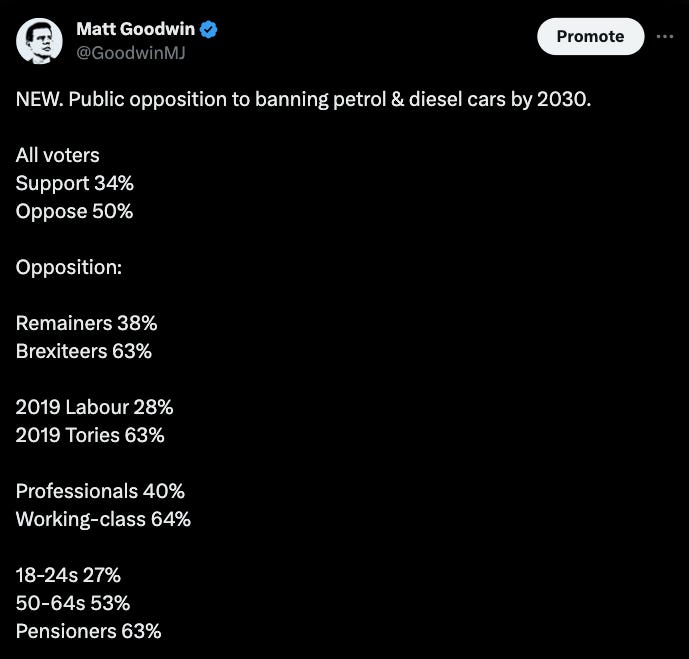Rishi's Rollback of Net Zero
What people REALLY think --and why the consensus is off
Matt Goodwin’s Substack goes to more than 56,900 subscribers from 167 countries around the world and thousands of paying supporters who support our work. Like our stuff? Then help us expand by becoming a paid supporter and access everything —the full archive, Live with Matt each week, exclusive posts, polling, leave comments, join the debate, get discounts, notice about events, and the knowledge you’re supporting independent writers who are not afraid to push back against the grain. Join us on YouTube, Instagram, TikTok, Twitter/X and Facebook.
Rishi Sunak has just announced a significant rollback of Net Zero deadlines in what is one of the most significant moments in his premiership to date.
What’s the plan?
A ban on the sale of petrol and diesel cars has been pushed back, from 2030 to 2035, bringing Britain in line with much of Europe.
The transition to heat pumps has also been pushed back to 2035 and will be forced only when buying a new boiler.
Forthcoming property energy efficiency requirements have been scrapped, as has a future requirement to have seven different bins.
There will be no new flight tax.
No ban oil and gas in the North Sea.
A ban on onshore wind is being lifted.
And grants to upgrade boilers have increased to £7,500.
“I care about reaching Net Zero by 2050”, said the prime minister, “but on the current path, we risk losing the consent of British people”.
Cue a meltdown among the elite class.
In the newspapers and on social media, the usual suspects are already lining up en masse to proclaim the move is a total disaster and the end of the world is nigh.
Rishi Sunak, so the thinking goes, is dangerously out-of-touch with the elite consensus. He is pitching to the past. not the present.
And he is now surely destined for failure at the election next year.
But is that really the case?
Well, not quite.
As luck would have it, I’ve recently been polling a large, nationally representative sample of British voters about these issues.
And the findings are not quite what you’d expect were you to listen only to the pro-green, pro-Net Zero, pro-consensus types who dominate the national debate.
For a start, many of the policies Rishi Sunak just announced are actually very popular among the very voters he urgently and desperately needs to win back.
Pushing back a ban on the sale of diesel and petrol cars to 2035?
When I asked all voters what they thought about the ban 50% said they opposed it and only 34% supported it (the rest were undecided). YouGov find the same.
This opposition is also much stronger among the specific voters who will ultimately determine whether Rishi Sunak can put his party’s electorate back together.
It soars to 53% among 50-64 year olds, 63% among pensioners, 64% among the skilled working-class, 63% among 2019 Tories, and 63% among Brexit voters.
It’s the same story when you ask voters whether environmental-related taxes and penalties on motorists have ‘gone too far’, are ‘about right’, or ‘should go further’.
Only 17% of all voters in the country think the status-quo is about right and only 11% want environmental fines and penalties to go further.
In other words, those who want to put the pedal down on things like ULEZ and other green taxes really are in a small minority (as progressives usually are).
The most popular view, meanwhile, held by almost half the country, 47%, is “environmental-related taxes and penalties have gone too far”.
And, once again, these figures are much higher among the very voters Rishi Sunak needs and who are the most likely to feel the financial costs of these measures.
Six in ten of Britain’s skilled working-class voters and close to two-thirds of 2019 Tories and Brexiteers think green fines and penalties have gone too far.
Voters outside inner London, outside the big cities, outside the university towns, who are more dependent on cars, and more exposed to the financial costs of Net Zero, are consistently the most likely to think green costs have ‘gone too far’.
And they’re also —as I’ve shown before— far more opposed to other green schemes like the extension of Ultra Low Emission Zone (ULEZ) fines in Greater London.
Workers, pensioners, 2019 Tories and Brexiteers are all far more likely than others to oppose ULEZ, to say they do not want a ULEZ in their local area, to support the ‘blade runner’ anti-ULEZ vigilantes, and to think government should prioritise the cost of living even this means it has to do less on Net Zero.
What we are witnessing then, in my view at least, and as I’ve been arguing for a while, is the gradual emergence of a powerful new divide in British politics. Let me explain what I mean and why I think it matters for the looming election and beyond.




